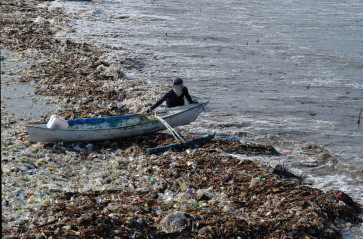Popular Reads
Top Results
Can't find what you're looking for?
View all search resultsPopular Reads
Top Results
Can't find what you're looking for?
View all search resultsRelative blames food poisoning for 2 Bali deaths
An Australian woman and her teenage daughter who became ill and died within hours of each other while on vacation on the tourist island of Bali were probably killed by a form of food poisoning, a relative said Wednesday
Change text size
Gift Premium Articles
to Anyone
A
n Australian woman and her teenage daughter who became ill and died within hours of each other while on vacation on the tourist island of Bali were probably killed by a form of food poisoning, a relative said Wednesday.
Noeline Bischoff, 54, and her 14-year-old daughter, Yvana, from Queensland state, died last month less than a day after eating fish at a restaurant on the Indonesian island.
Their bodies were returned to the Queensland capital, Brisbane, where autopsies were performed.
The mother's brother, Malcolm Bischoff, said forensic pathologists told the family on Tuesday that preliminary results showed both died of scombroid poisoning. The poisoning is caused by high concentrations of histamine ' a compound that triggers allergic reactions ' from bacteria in spoiling fish.
Malcolm Bischoff said he accepted that conclusion, although he initially suspected foul play.
"Just straight-out food poisoning or a food allergy ' it just doesn't make sense for two people to die," he told Australian Broadcasting Corp. radio.
The coroner's office confirmed in a statement on Wednesday that the family had been told the "possible causes of death" by forensic pathologists. However, testing had not yet been finalized, the statement said.
The mother and daughter became ill on Jan. 3 after eating dinner. Both were dizzy, vomiting and had difficulty breathing. The mother died in an ambulance on the way to a medical clinic early the next morning, and her daughter died in a clinic about three hours later.
There were no other confirmed reports of serious illness at the time from the same eatery, the Buddha Bar and Restaurant.
Steve Hambleton, president of the Australian Medical Association, said scombroid poisoning rarely caused serious illness.
"People with asthma ... are more sensitive to histamine and that's why probably in this case two people with mild asthma showed a very, very, severe reaction," he told ABC.
"Most people have a relatively mild illness. They show a rash, they show signs of flushing, palpitations, sometimes headaches, abdominal pains, sometimes a sense of anxiety ' all of these things, they probably did experience, but their reaction went on to become much more serious," he said.
The mother and daughter might have responded to treatment with antihistamine and asthma medications, he said. (**)










